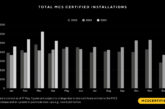
Changes to the Boiler Upgrade Scheme (BUS) which remove the requirement to have no outstanding recommendations for loft and cavity wall installation on a property’s Energy Performance Certificate to secure funding for a heat pump have been criticised by OFTEC.
The BUS offers grants of £7,500 to help households switch to the low carbon technology. The government announced the changes following a consultation and claimed it will help reduce the cost of installing a heat pump.
In response, OFTEC has raised concerns this breaks with the long-established fabric-first retrofit principles and could lead to poorer outcomes for consumers, including more expensive heating bills and a less efficient system. The trade association argues the requirements were there to protect consumers by ensuring their home was fully optimised for a heat pump.
Malcolm Farrow, Head of Public Affairs at OFTEC, (pictured) commented: “The changes to BUS mean, for the unaware consumer, the cost of installing a heat pump has seemingly come down. The reality is though nothing has changed. Indeed, the long-established retrofit principle of fabric first is arguably even more valid now, given the current high cost of energy. This policy change is about driving heat pumps sales but risks poorer outcomes for consumers who install a heat pump without making the recommended energy improvements. The negative experiences that may result risks knocking confidence in heat pumps which could hinder uptake. Consumers will blame the technology when the reality is it’s the poor installation.
“This is also fertile ground for cowboy tradespeople to take advantage. Whilst competent installers will point out the benefits of insulation improvements before installing a heat pump, less scrupulous installers could use this policy change to offer lower prices with little interest in the negative consequences. Even if the heat pump is sized correctly, the outcome will be sub optimal because it will also mean the owner will be left with and oversize heat pump if they later decide to improve insulation, with likely poorer performance as a consequence.”
The organisation says that the change also raises broader questions about how far policy measures should go to incentivise heat pumps. Malcolm Farrow added: “It’s right that the government uses incentives to reduce upfront costs until the market is more mature. However, with heat pump sales sluggish, it’s essential that support to boost their deployment does not benefit only a minority of households, or come at the expense of a wider drive to improve energy efficiency and reduce emissions.
“Those taking advantage of the BUS scheme are overwhelmingly from relatively affluent households, and it’s important that the wealthy are not rewarded disproportionally in the clean heat transition, or that less affluent households are left behind. We need to focus not on simply growing the heat pump market at any cost, and instead on achieving the best solution in each and every location, by using all the options at our disposal.
“That’s why other technologies, including renewable liquid fuels, have to be a part of the equation. For the 1.7 million oil heated homes, where heat pumps are often less suitable, they could switch to Hydrotreated Vegetable Oil (HVO) for minimal cost and disruption and cut emissions by up to 88%. Giving households choice will drive better outcomes as they can choose the solution most suited to their circumstances. It’s time to stop trying to force consumers down a particular route and instead deliver a pragmatic multi-technological solution to achieve our net zero commitments.”













